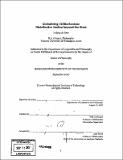Globalizing utilitarianism : distributive justice beyond the state
Author(s)
De Bres, Helena
DownloadFull printable version (16.42Mb)
Other Contributors
Massachusetts Institute of Technology. Dept. of Linguistics and Philosophy.
Advisor
Sally Haslanger.
Terms of use
Metadata
Show full item recordAbstract
This dissertation develops and defends a utilitarian approach to global distributive justice: that part of political ethics that is concerned with the distribution of benefits and burdens across the members of distinct societies. Surprisingly little has been written by utilitarians, or by welfare consequentialists in general, on this topic. Many philosophers believe that utilitarianism is incapable of arriving at morally acceptable conclusions concerning global distributive justice, to the extent that it does not merit serious consideration in philosophical debates in the area. The central thesis of the dissertation is that that view is mistaken, and that utilitarianism in fact provides an attractive and useful way of conceiving of our global distributive duties. The main argument begins by distinguishing three types of goal at which principles of distributive justice might be directed. One such goal is the attainment by individuals of a minimally decent level of welfare, a second the treatment of individuals in accordance with norms of fairness, a third the obtaining of a certain degree of equality across individuals, for reasons independent of the first two goals. I then consider whether or not there is a utilitarian case for each of these goals at the global level. I argue that, while the utilitarian case for global equality per se is currently weak, a concern at the global level both for what I call "decency" and for distributive fairness can and should be incorporated into the framework of utilitarianism. I present an account of precisely what form these goals ought to take at the global level, how they intersect with concerns about domestic distributive justice and collective self-determination, and how they translate into duties on the part of individual states and international institutions. (cont.) I also draw out the implications of the resulting principles and duties for some specific aspects of global political economy and international law (including trade in goods, services and ideas; development; and immigration). The result is a distinctive conception of the ground, scope and content of global distributive justice that I hope will appeal, at least in part, to utilitarians and non-utilitarians alike.
Description
Thesis (Ph. D.)--Massachusetts Institute of Technology, Dept. of Linguistics and Philosophy, 2007. Includes bibliographical references (p. 165-173).
Date issued
2007Department
Massachusetts Institute of Technology. Department of Linguistics and PhilosophyPublisher
Massachusetts Institute of Technology
Keywords
Linguistics and Philosophy.